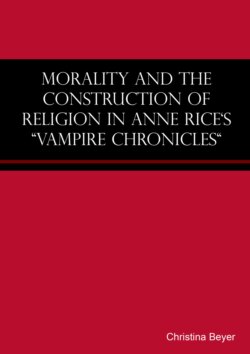Читать книгу Morality and the Construction of Religion in Anne Rice's "Vampire Chronicles" - Christina Beyer - Страница 3
На сайте Литреса книга снята с продажи.
ОглавлениеIntroduction
MORALITY AND THE CONSTRUCTION OF RELIGION IN ANNE RICE’S VAMPIRE CHRONICLES
CHRISTINA BEYER
MORALITY IN
ANNE RICE’S VAMPIRE CHRONICLES
“There is a reason that all things are as they are, and did you see with my eyes and know with my knowledge, you would perhaps better understand“ (Stoker 27)
Anne Rice’s Vampire Chronicles have been a huge success worldwide. Many fans of Vampire Fiction are familiar with the likeable protagonist Louis from her first book Interview with the vampire. The undead nobleman has released a mass production of other vampire tales. The once monstrous vampire has somehow managed to become a desirable and even romantic figure.
Anne Rice is one of the first authors who have chosen to write from a vampire’s perspective. This point of view is often used in contemporary literature and films such as Twilight or The Vampire Diaries. With a changed perspective on the fictional figure of the vampire, new questions arise with which the reader has not yet been confronted. Taking into account that there are masses of stories on the market at the moment, the figure of the morally aware vampire confronts us with the question why ethical matters are important to something that represents otherness.
Having completed the transformation from one species to another, laws are no longer applicable. Therefore, the vampire finds himself in a constant struggle with morality, due to his previous human life in which he was part of a moral community.
Therefore, the otherness of this being will be compared to society. In order to do that, an insight into the Monster theory by Jeffrey Jerome Cohen will be provided in this work. Since Rice is one of the first writers to make an attempt to change the perspective and let the monster become the protagonist, it is relevant to ask if the first person narration can take away “the otherness“ of the vampire.
In this thesis, first of all the question if a vampire can still be read as a person will be considered. Since moral rules are generally applicable to living persons only, this question is immensely important in order to find out if Rice’s protagonists are morally obliged to live according to legal laws. This question will be answered by a short portrayal of an essay by Nicholas Michaud who asks Can a vampire be a person. Only if this question can be answered positively, the vampire is obliged to live according to moral standards. Otherwise, human rules are no longer relevant.
In that case, it may be important to ask if there are other rules which are relevant for the vampire species. These can be found in Rice’s third novel The Queen of the Damned.
Having set a frame for similarities and differences regarding human society, the characters of Louis and Lestat will be examined in more detail. Here, it is striking that a different kind of upbringing, as well as opposed personalities lead to a perception of morality that could not be more different.
Louis shows a very strong sense of morality and finds himself in a constant struggle with his vampire nature and his concept of goodness. In order to understand why it is so important for him to hold on to humanity, the influence of the church will be regarded in detail. Taking into consideration the importance of religion and the ethics that arise from the Christian believe will help to explain his suffering. At this point, the previously asked question of a possible personhood will become important again, because if a vampire is part of a moral community, he also has to fear the existence of God. Interview with the Vampire is partly concerned with this question in order to find out if damnation is to be feared or not.
Opposed to the sensitive protagonist, we find a different outlook on life in Lestat. Having been fond of killing wolves during his short life time, the act of killing comes much more naturally to him. Also, he is able to see the advantages in his new strengths. Therefore, both characters complete the portrayal of Anne Rice’s vampires.
Regarding the character of Lestat, it will also be interesting to take some of Nietzsche’s works into consideration. Taking a closer look at the way he chooses to live, Lestat is exactly what Nietzsche had in mind when he wrote about the Übermensch. From this point of view, Lestat is not only free of a guilty conscience about his “sins“, instead he represents a moral ideal by living according to his supreme nature. Rice therefore gives at least two possible views on a killing supernatural being. On the one hand, he is damned to wait for eternal punishment for his sins, on the other hand he can be regarded as an advanced superior being that is able to free itself from the restrictions of the human society.
